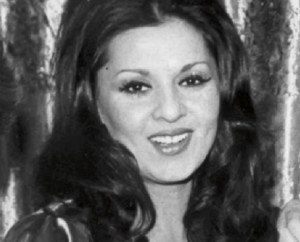
“Early this morning in Belgrade, well-known Romani singer and stage actress Usnija Redžepova succumbed to the lung cancer she'd been battling for the last three years,” Alex Marković posted to the EEFC listserv on October 1, 2015.
Usnija Redžepova was born on February 4, 1946, in Skopje, Macedonia, of Romani and Turkish parents who were very poor.
At around age 17, she excelled in a Radio Skopje pop singing contest and radio officials tried to convince her strict father to let her become a professional singer, which was not considered a suitable path for a Romani girl at the time. He prevailed and she continued with her schooling, but after completing her secondary studies, she began singing in cafes and then joined the Nasko Džorlev ensemble and toured Yugoslavia for five years.
In 1966 she released her first recordings on the Jugoton label. For her early recordings, the studio assigned her the stage name Usnija Jašarova to avoid confusion with Esma Redžepova; the two were not related but were friends and later recorded an album together (Songs of a Macedonian Gypsy, ca. 1975). Over the following decades, Usnija Redžepova released many singles and nine albums, mainly of folk songs from Southern Serbia and Macedonia, sung in Serbian, Macedonian, Romani and Turkish.
“Together with Esma, Usnija was one of the first Romani women to make it on the national music scene in socialist Yugoslavia, and to popularize songs in the Romani language, among other things,” Alex says. “She was also famous for dancing while performing on stage, with that wonderfully subtle Romani dance aesthetic typical of the communities in southern Serbia and Macedonia. She was best known (interestingly) for popularizing music from southern Serbia and particularly Vranje, often performing with the best-known brass bands of the area. She sang both folk songs and composed songs.”
In 1973 Usnija Redžepova was asked to star in a stage play, Žarko Jovanović’s new adaptation of Koštana, a popular drama by Bora Stanković about the Romani singer and dancer Malika Eminović Koštana of Vranje. She joined the National Theatre in Belgrade and stayed there until 1999, while continuing to record music and perform music at home and abroad. She also appeared in two films and a 1980 TV adaptation of Koštana.
“She was a beautiful performer and had a very specific vocal quality and style of singing, by turns sweet and raw, exuberant, edgy,” Alex says. “ In the 1980s she recorded many of her famous songs, and was featured quite regularly on television in music videos and for live performances during shows.”
Here are some videos that Alex collected:
Aber kruži (The Word Is Going Around): accompanied by the Bakija Bakić brass band from Vranje
Kazuj, krčmo, džerimo (Tell Me, Tavern): a song closely associated with Vranje today [note the almost comical backup dancers performing a stylized folk form, in comparison with Usnija's more reserved Romani style dancing! Ah, the 1980s....]
Keremejle: one of the few songs in Ottoman Turkish still remembered in Vranje, here performed to the accompaniment of the Bakija Bakić brass band
Thanks to Alex Marković, Wikipedia and the Internet Movie Database for the information in this article.

